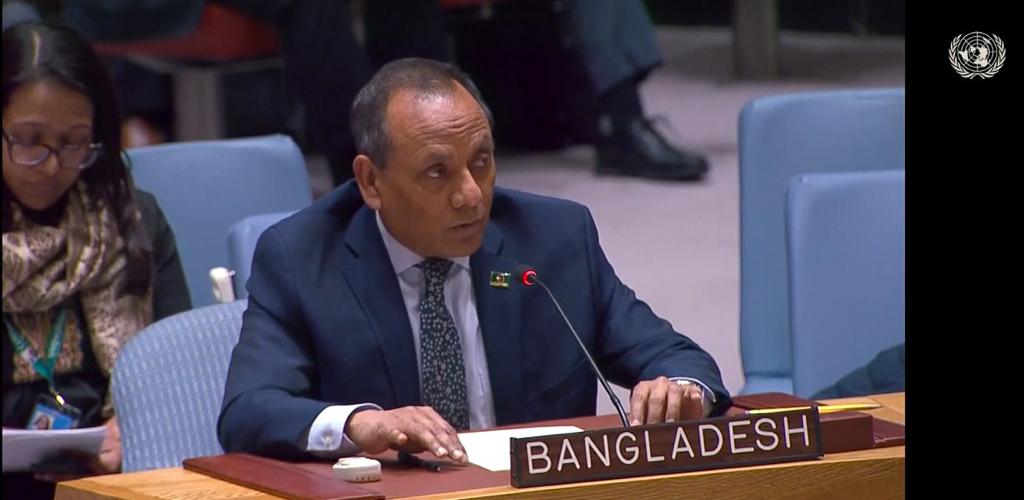Mr. President,
We warmly congratulate the US delegation for assuming the Presidency of the Security Council for the month of August.
We welcome the convening of today’s timely debate, and thank the distinguished briefers for their valuable remarks.
Mr. President,
The global food security landscape, a critical component of overall human security, has been significantly impacted by conflict and climate change in the recent years. Bangladesh is no exception. The ongoing war in Ukraine and related sanctions and counter sanctions have severely affected our import bills and thus jeopardized our efforts to ensure food security for 168 million people of Bangladesh.
Yet we are trying our best to tackle the challenges including through difficult policy measures, such as, withdrawing subsidies in the energy sector, limiting imports and reducing public expenditure. As long-term measures, we have prioritized investments in agri-food systems. Our Prime Minister Sheikh Hasina has encouraged all to cultivate unused lands in every household.
At the international level, we support all global efforts in addressing food insecurity. As one of the Champions of the Secretary-General’s Global Crisis Response Group, our Prime Minister is advocating for and facilitating global consensus on actions to prevent, mitigate, and respond to the food crisis and related challenges.
Mr. President,
Given the systemic nature of this crisis, we need collective endeavor. Allow me to highlight four specific points in this regard:
First: It is essential to address factors that affect food prices and access, especially during conflict. We support the Secretary-General’s call to keep markets open, remove unnecessary export restrictions, and release food reserves to improve food supply. It is also critical to keep the ‘Black Sea Grain Deal’ alive.
Equally important is to continue strengthening diplomatic efforts to end wars – the very causes of human suffering.
Second: We denounce the use of famine and starvation as weapons of war, which are prohibited by the 1977 additional protocols to the Geneva Conventions. Furthermore, the Rome Statute recognizes such actions as a direct violation of international law, constituting crimes against humanity.
We call upon all member states to remain committed to those obligations. We also call upon parties to armed conflict to refrain from attacking critical infrastructure that are essential for production, distribution and transport of food.
Third: Climate change and related disasters have serious impacts on food security. To address those, we have implemented various innovative agricultural practices. In the last 14 years, our scientists have developed 690 improved and high yielding crop varieties and salinity-tolerant rice varieties. We are now working on drought and submergence tolerant varieties.
It is critical to further invest in these sectors. We reiterate our call for international cooperation, including South-South cooperation, climate financing and technology transfer to support the vulnerable countries like Bangladesh. The development of a food stockholding mechanism for the LDCs, as stipulated in the Doha Programme of Action, should also be pursued seriously.
Finally: Bangladesh is also affected by the endless conflicts and insecurity in Myanmar. For last 6 years, we have been hosting over 1.2 million Rohingyas who fled persecution and violence in Myanmar.
However, due to multiple humanitarian emergencies, the UN and other humanitarian partners are now facing funding shortfalls in supporting the Rohingyas sheltered in Bangladesh. The World Food Programme had to implement rations cut twice. As mentioned by Secretary Blinken, a Rohingya receives only 27 cents a day for their food intake. This dire situation is leading to malnutrition, insecurity and violence in the camps.
We call upon the Council to pay urgent attention to the lingering conflict in Myanmar, and help create conducive environment there to enable safe and sustainable repatriation of the Rohingyas. International community must also continue providing adequate funding to the humanitarian response plan for the displaced Rohingyas until they are able to return to Myanmar.
In conclusion, I wish to flag the need for addressing food wastage as a crucial aspect of global food insecurity, and call for building a broad-based social movement to prevent this.
I thank you, Mr. President.

